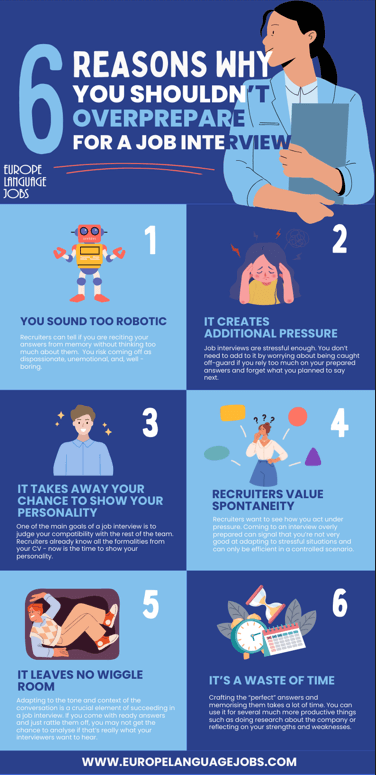Yes - there is such a thing as being too prepared for a job interview. And it is bad.
If you want to succeed in a job interview, you should research the most common interview questions and prepare answers for them in advance. Then, we recommend to practice in front of a mirror, with a friend, or by filming yourself.
But there is one more tip that’s less commonly spoken about: switch your answers up every time you practice. Don’t repeat them word for word, and don’t try to memorise them.

You should have a general idea of what to expect in a job interview and prepare to answer common questions just so you wouldn’t be caught off-guard and panic or think too long about a response.
But you must never learn your answers by heart and always leave some room for spontaneity. Here is why you shouldn’t be too prepared for a job interview:
- You sound too robotic
- It creates additional pressure
- It takes away the chance to show your personality
- Recruiters value spontaneity
- It leaves no wiggle room
- It's a waste of time

1. You sound too robotic
Have you ever been to a play and thought an actor wasn’t very good because of how they rattled off their script? It can feel disconnected, artificial, and ruin the experience for you, no matter how good the other actors are.
The same can happen in a job interview.
Recruiters can tell if you are reciting your answers from memory without thinking too much about them. Rather than commanding you for preparing so well, they can perceive you as dispassionate, unemotional, and, well - boring.
Hiring managers want to see passion. They need to know that the person they hire is genuinely interested in their field of work and will show motivation. Sounding like a robot hardly achieves that.

2. It creates additional pressure
Memorising your answers for a job interview is like preparing for a role you have to play. It makes a job interview feel like a stage play which, in turn, creates stage fright.
Job interviews are stressful enough. You don’t need to add to it by worrying about being caught off-guard if you rely too much on your prepared answers and forget what you planned to say next.
Have you ever danced, sung, acted, or played an instrument? If not, you have definitely seen someone else do it. And you must have experienced or witnessed a moment when you or someone else forgot the lyrics, the next steps of a dance, or their next line.
It is a natural reaction to freeze in such a scenario. Your brain scrambles, and all you want is for the ground to open and swallow you whole.
Everyone makes mistakes, and the goal of a job interview isn’t to come off as perfect. Frankly, what matters most is showing how quick on your feet you are and demonstrating your strategies to recover from a slip-up.
Our brains enter different modes when we memorise something versus when we act spontaneously. Our thoughts are much more elastic in the second scenario, which is why that’s the mode we should adapt in situations such as a job interview.

3. It takes away your chance to show your personality
If you get invited to a job interview, it means that your resume has done its job. Now, it’s time to show that there’s much more to you than what can be contained in a single piece of paper.
Recruiters want to get to know you as a person. They already know all the formalities such as your education, experience, and background from your CV and LinkedIn profile.
Of course, they will ask you questions related to your past jobs and skills, but they want to see the real you in-between the lines.
Let’s continue with the comparison of job interviews to performances. When you attend a job interview prepared but with room for spontaneity, you get to play yourself. If you memorise all the answers, it’s like entering a role and being in character.
You can’t be fully yourself when reciting responses you have learnt by heart. You will be too focused on playing the part of the person you want the recruiters to see to actually let your true personality shine through.
And people don’t get hired just based on work experience and skills. If that was the case, job interviews wouldn’t exist, because a CV would be enough to find out everything an employer needs to know to make a decision.
No, one of the main goals of a job interview is to judge your compatibility with the rest of the team. Personality hires are a growing trend with the spread of awareness regarding the importance of creating a healthy workplace.
A job interview is also meant to help you stand out. You have to outshine other candidates with either your amazing skills or sparkling personality - or both. You can’t achieve that by playing a part.
Don’t overprepare or try to become someone you think the recruiters want you to be. Be the real you, and if the job is a good match for you, it will be yours.

4. Recruiters value spontaneity
Hiring managers don’t want to see a rehearsed performance. They need to be sure that they meet the real you, and not just a persona you decided to play.
What’s more, they want to see how you act under pressure. That’s the main reason why they sometimes ask random questions such as “what animal would you be and why?” or “how would you go about moving a 3-ton piece of rock?”.
You can’t prepare answers to such questions in advance because you don’t usually expect them - and that’s exactly the point.
Recruiters judge your critical thinking and decision-making and try to understand the way you think. There are certain skills you can’t prove through a traditional competence test, and they will find alternative methods to determine whether you have them.
In everyday life, you can’t always be prepared for every task you receive or predict every crisis that comes your way. Coming to an interview overly prepared can signal that you’re not very good at adapting to stressful situations and can only be efficient in a controlled scenario.
If you want to impress recruiters, do your research about the company before your job interview. That’s the kind of preparation they want to see.

5. It leaves no wiggle room
While you may know what to expect from a job interview in general, you won’t predict exactly the way the conversation will go. It may be more formal or relaxed than you thought. Or the focus might be placed more on your personality than your skills, or the other way round.
Adapting to the tone and context of the conversation is a crucial element of succeeding in a job interview. If you come with ready answers and just rattle them off, you may not get the chance to analyse if that’s really what your interviewers want to hear.
Of course, you should always tell the truth. But there are several ways to say it. Which one you choose depends entirely on your judgement of the situation and intuition.
If you notice that the recruiters are more relaxed, cracking a small joke might help you win them over. On the contrary, if their behaviour is very formal, they might not appreciate humorous answers.
The self-induced pressure of delivering the “perfect” answer in the exact wording you have prepared can smother your instincts. This, in turn, leaves no space for adjustment and can consequentially doom your chances of succeeding in a job interview.

6. It’s a waste of time
Crafting the “perfect” answers and memorising them takes a lot of time. You can use it for several much more productive things. Here are some examples:
-
Reflect on your strengths and weaknesses
-
Re-read your CV to know exactly what you put on it
-
Carefully scan the job description for duties, requirements, and benefits
-
Try to find out more about your interviewer(s)
-
Do research about the company: what it does and what values it promotes
-
Prepare a list of questions you’d like to ask during the interview
The list doesn’t even include other things you can do such as cuddling with your pet, reading a book, going out with friends, or anything else that helps you relax before a stressful experience. Those activities are also important.
If you check all the boxes on the list, you won’t even have to worry about crafting perfect answers before the interview. Your level of self-awareness and your knowledge about the position and company you’re interviewing for will be enough to come off as professional and confident.
To conclude, preparing for a job interview is necessary. Overpreparing is bad.
To prepare means to find out what kind of questions you can expect, do your research about the company, and have a strong understanding of your personal background, goals, and motivations.
Overpreparing for a job interview includes crafting exact answers for the most common interview questions and memorising them word-for-word. Many candidates do it in order to deliver responses that in their opinion are perfect, but this tactic usually brings more stress than benefits.
Be prepared but spontaneous to retain flexibility and clarity. Adjust your tone and answers to the attitude of your interviewer(s) and the course of the conversation. Let your intuition guide you and show off your personality.
Providing answers which are crafted too perfectly can give the recruiters an impression that you’re dispassionate or pretending to be someone you’re not. Being authentic and having confidence is what will help you succeed in a job interview.
Feeling inspired? Visit our blog for more career advice! How can you be sure the information we provide is top-notch? We are a group of professionals working with recruiters, career coaches, and HR specialists from all over the world!
Trust our experience and let us help you find a new job in Europe!





















Niko Pallonenq1y ago
So many good points in this article!
So many good points in this article!